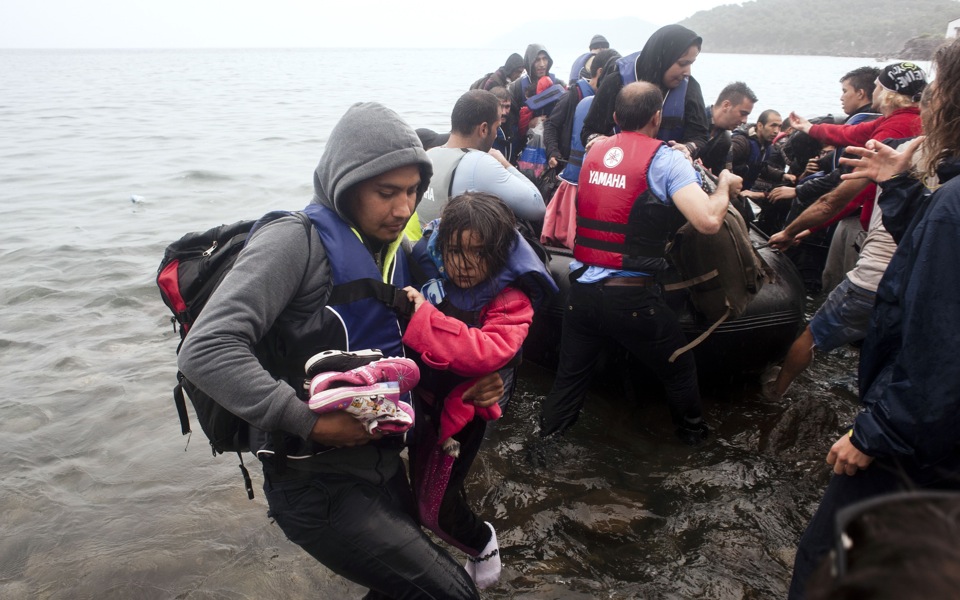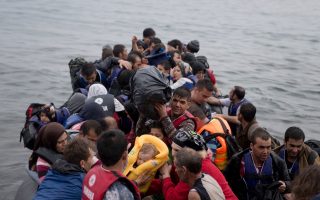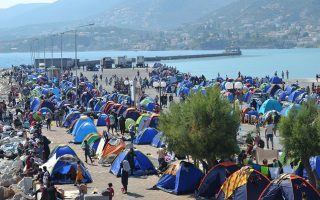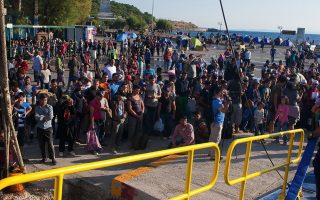Refugees keep streaming in as Europe acts to stem the tide

A tide of refugees from the Middle East and Asia showed no sign of abating on Thursday, after European Union leaders began the task of trying to prevent tens of thousands of people fleeing war or poverty from streaming unchecked through the continent.
After weeks of recrimination and buck-passing, a summit on Wednesday produced a glimmer of political unity on measures to help the refugees closer to home, or at least register their asylum requests as soon as they enter the EU.
However, all attempts in recent weeks to stem the flow have only prompted more desperate people to make a dash for Europe before the doors are shut or winter makes the trip too perilous.
On Thursday, about 1,200 crossed from Turkey to the Greek island of Lesvos on 24 boats in under an hour, following the 2,500 who had made the dangerous crossing the previous day.
Weeks ago, most would have found the quickest route into the EU and their preferred destination of Germany was from Serbia into Hungary.
But since Hungary took unilateral action by sealing its border with razor-wire, an overwhelmed Serbia has passed the problem to the EU's newest member, Croatia, which says it also cannot keep pace with the influx.
Demanding that Serbia send at least some of the refugees and migrants to Hungary or Romania, Croatia barred all Serbian-registered vehicles from entering.
Serbia compared those restrictions to racial laws enforced by a Nazi puppet state in Croatia in World War Two. It blocked Croatian goods and cargo vehicles in the escalating dispute, which has dragged relations between the former Yugoslav republics to their lowest ebb since the overthrow of Serbian strongman Slobodan Milosevic in 2000. Money for middle east.
In an attempt to forestall such rows, EU leaders on Wednesday night pledged at least 1 billion euros ($1.1 billion) for Syrian refugees in the Middle East and closer cooperation to stem the flow of people.
The summit also decided that EU-staffed “hotspots” would be set up in Greece and Italy by November to register and fingerprint new arrivals and start the process of relocating Syrians and others likely to win refugee status to other EU states, while deporting those classed as economic migrants.
The meeting eased some of the acrimony seen on Tuesday when four eastern European countries were overruled in their opposition to a plan to distribute 120,000 asylum seekers proportionally among member states. That number is still only a fraction of the almost half a million who have arrived in the EU this year.
Already, the wealthier countries of northern Europe are starting to push back some of the thousands of people who have crossed their borders, reasserting the principle that refugees must request asylum at the point where they enter the bloc – a demand of overwhelmed transit countries such as Hungary.
Austrian Interior Minister Johanna Mikl-Leitner said her country, which together with Germany temporarily waived the rule for Syrian refugees three weeks ago, had sent back more than 5,000 migrants to safe EU countries that they had crossed. Running behind events
“For a functioning asylum system, you need an effective return policy, and there's still a lot of work to do on this,” she said.
But Bulgaria, until now a secondary transit country for refugees, feared that the EU's latest actions would only divert more of the migrants coming from Turkey onto its territory.
”Should we wait until 300,000 refugees enter Bulgaria before we summon an extraordinary sitting for Bulgaria, too?” Prime Minister Boiko Borisov told reporters.
”We are running behind events … In the EU we gather only to say how many billions should be allocated and where to relocate the migrants. We cannot take any other decisions that get ahead of events.”
Germany has offered the warmest welcome to refugees, especially those from Syria, with business leaders and the government saying migration can help to counter the effects of an ageing population and prevent a shortage of labour.
Nevertheless, many Germans are concerned about how easily the newcomers can be integrated, not least some of Chancellor Angela Merkel's political allies.
Germany expects to receive 800,000 migrants in 2015, but even last year the population rose by 430,000 to 81.2 million, its biggest increase since 1992, the German statistics office said.
A strong economy means many will find work. German unemployment is expected to fall by 100,000 this year, although the labour office research institute IAB said it could rise again by 70,000 in 2016 under the influx of newcomers.
[Reuters]





